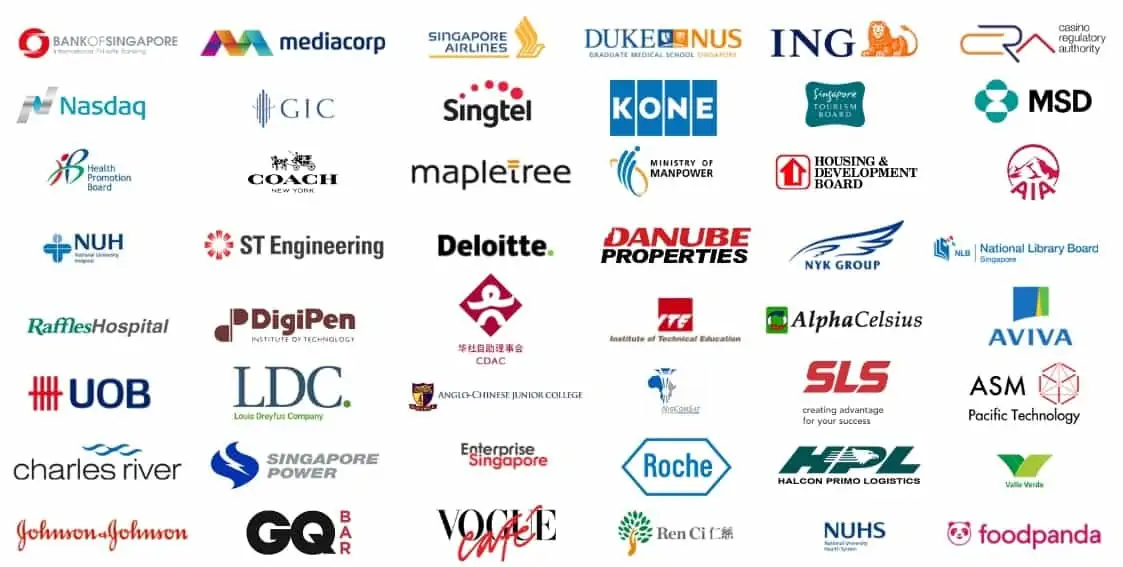Executive Communication Skills Training
Executive Communication Skills Training

Executive Communication Skills Training by Knowles Training Institute. Why are communication workshops so important? Well, excellent communication abilities can enhance the way that you progress through life, creating a great relationship with others.On the other hand, poor communication skills can sour both business and personal relationships, making your life significantly more difficult.
Having the option to communicate adequately is maybe the most significant of all fundamental abilities. It is the thing that empowers us to pass information to other individuals and to comprehend what is said to us. Communication, at its most straightforward, is the demonstration of information from one person or place to another. Register for our communications workshops today! We have delivered to over 1000 satisfied clients in Singapore and around the world.
–
List of Our Executive Communication Skills Training:
We have 4 main types of communication training courses. Verbal, non-verbal, written and visual communication skills workshops.
Verbal Executive Communication Skills Training
- Active Listening Workshop
- Verbal Communication Skills Workshop
- Giving Praise Workshop
- Giving And Getting Feedback Workshop
- Having Difficult Conversations Workshop
- Empathic Listening Workshop
- Mindful Listening Workshop
- Developing A Powerful Voice Workshop
Non- Verbal Executive Communication Skills Training
Written Executive Communication Skills Training
- Business Writing Workshop
- Proposal Writing Workshop
- Report Writing Workshop
- Technical Writing Workshop
- Writing Business Cases Workhop
- Writing Effective Emails Workshop
- Writing a Standard Operating Procedure (SOP) Workshop
Visual Executive Communication Skills Training


Fill up the form and we will get back to you in less than 1 working day.
Alternatively, give us a call to have one of our training consultants contact you. Our corporate training courses can be contextualized to meet your organization’s training needs. Leverage on our large pool of professional trainers and consultants for your organization’s training needs.
Office Address: 60 Paya Lebar Rd, #07-54 Paya Lebar Square, Singapore 409051
Office Phone: +65 6714 6663
Email: contact@knowlesti.sg
We Guarantee 100% Privacy. We Respect Your Privacy. Your Information Will Never Be Shared.
Questions
Any two people within the organization can communicate internally. However, executive communication indicates that at least one member of the organization’s executive team is involved. When a lower-level employee or manager communicates with an executive, the communication is both internal and administrative.
Corporate communication is a collection of activities involved in managing and organizing all internal and external communications directed at developing favourable point of view amongst stakeholders on which the company depends.
3 Rules For Communicating Like An Executives:
- Only say what matters.
- Stop thinking out loud.
- Just ask the question.
Types Of High Level Communication:
- Faster-Paced with a Task Priority
- Faster-Paced with a People Priority
- Slower-Paced with a People Priority
- Slower-Paced with a Task Priority
7 Skills Executives Needs:
- Leadership.
- Subject-specific skills.
- Change management.
- Commercial acumen.
- Communication.
- Strategic thinking.
- Decision making.
Employee communications, investor relationships, marketing and government relationships are all parts of the types of corporate communications a business will focus on. Depending on the size of the business or the industry a company is in, corporate communications might include extra areas.
Operating in corporate communications can be enjoyable and rewarding, but like most jobs, it isn’t without its challenges. CC includes everything from employee communications and engagement to media and government relationships, as well as marketing, event management, social media and more.
Types of Corporate Communication Tools:
- Newsletters.
- Video.
- Conferencing.
- Intranet.
- Mobile App.
- Chat / Forums.
- Surveys.
- Podcasts.
How to Impress Senior Managers
- Consider the big picture.
- Collaborate across functions.
- Be smart about money.
- Ask intelligent questions.
- Propose solutions.
- Share interesting information.
- Be succinct.
- Disagree respectfully.
Levels of communication:
- Verbal Level of Communication.
- Physical Level of Communication.
- Auditory Level of Communication.
- Emotional Level of Communication.
- Energetic Level of Communication.
“Communication is the method of transferring information and understanding from one person to another.” In simple words, it is a process of transferring and sharing ideas, facts, values etc. from one person to another or one company to another .”
4 (Four) Tips to Remember While Communicating With An Executive
- Get to the point
- Say what you mean, say what you believe
- Understand that if there is a flaw in your logic, they will find it
- They tend to be impatient and may be abrupt
Types Of Modern Tools Of Communication:
- Social Media.
- Social Media – Direct Message (DM)
- Instant Message (IM)
- SMS Text Messaging.
- Email Marketing.
- Direct Email.
- Blogging.
- Voice Calling.
Corporate communication is a management function that allows a framework for effective—coordination of all communication with the overall purpose of establishing. And keeping positive reputations with stakeholder groups upon which the organization is dependent.
Internal communication is the most important tool for management, just as employees are the company’s most important resource. The company’s story and core messages must empower employees and attract the best manpower to the company.
It is imperative to communicate effectively in discussions to guarantee that you achieve your purposes. Communication is also crucial within the business. Effective communication can help to raise a good working relationship between you and your staff, which can, in turn, better morale and efficiency.
